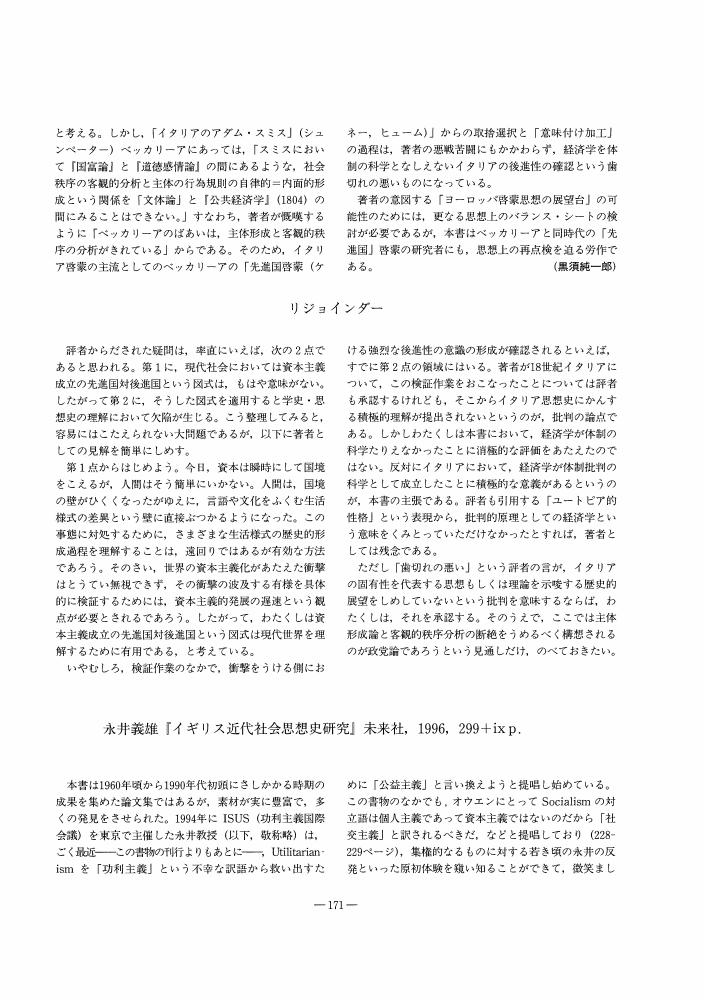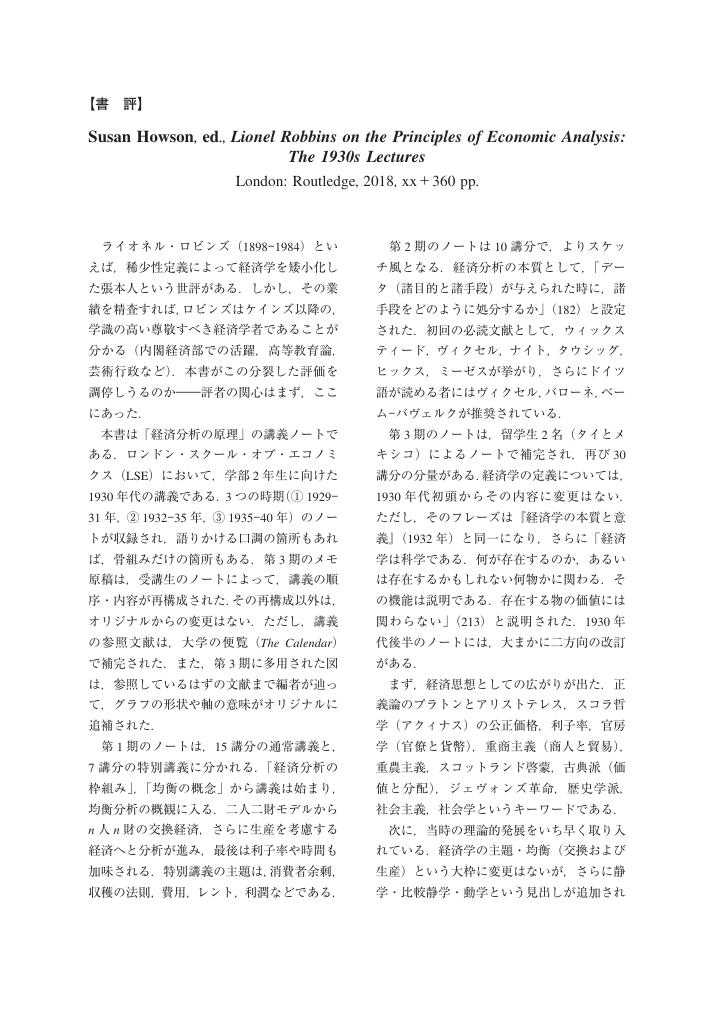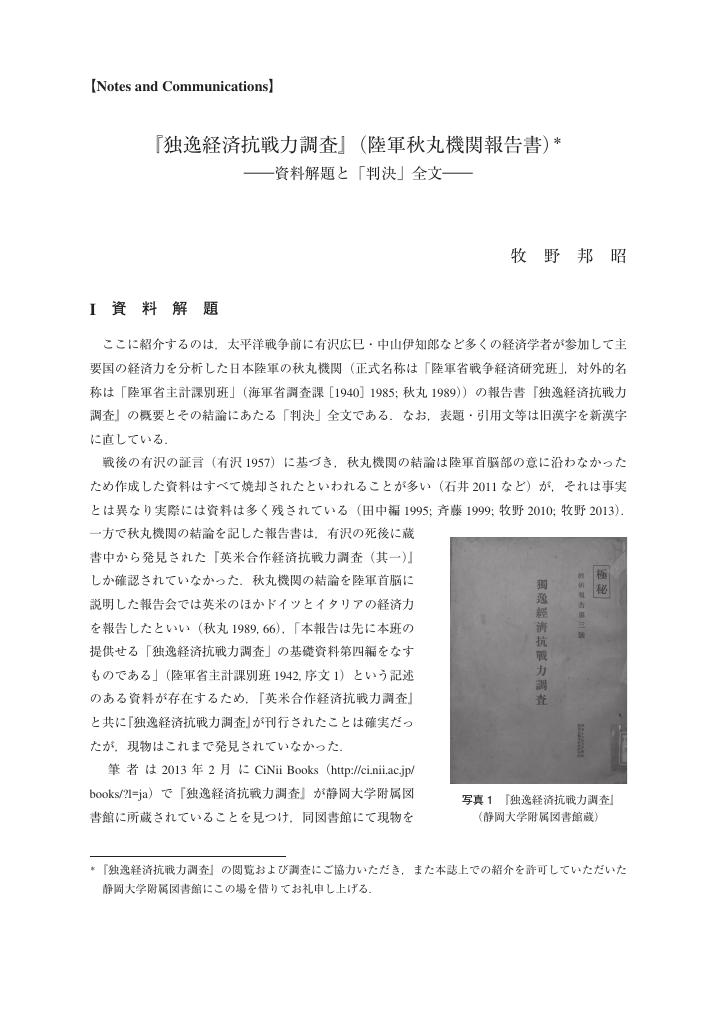- 著者
- 安藤 隆穂
- 出版者
- 経済学史学会
- 雑誌
- 経済学史学会年報 (ISSN:04534786)
- 巻号頁・発行日
- no.39, pp.20-27, 2001-05
2 0 0 0 OA アメリカにおけるハイエクの『隷属への道』 思想の受容・普及プロセスからのアプローチ
- 著者
- 吉野 裕介
- 出版者
- 経済学史学会
- 雑誌
- 経済学史研究 (ISSN:18803164)
- 巻号頁・発行日
- vol.55, no.1, pp.36-52, 2013 (Released:2019-08-23)
In this paper, we consider F. A. Hayekʼs The Road to Serfdom and the diffusion of the bookʼs ideas in the United States. The contributions of Fritz Machlup in the bookʼs development and acceptance are given special attention. Although The Road to Serfdom is Hayekʼs best-selling book, many Hayekian scholars choose to focus on his other work. Here, we ana-lyze the ideas of The Road to Serfdom in detail, so that we can find new aspects of Hayekʼs early thought and determine why the book has be-come so influential. Hayek wrote The Road to Serfdom for the intelligentsia of England, but its impact was felt most strongly by the general populous of the United States. Hayek maintained the core ideas of the book, the rule of law and meaning of com-petition, in his later work, such as The Constitu-tion of Liberty and Law, Legislation, and Liber-ty. Hayek and Machlup were in contact with each other their entire lives. The Hoover Institu-tion, a think tank at Stanford University, houses large amounts of correspondence that illustrate the friendship between the two men. Some mate-rial shows Machlup putting great efforts toward publishing The Road to Serfdom in the United States. Eventually, Aaron Director and Frank Knight helped Hayek publish the book with The University of Chicago Press. The condensed, il-lustrated version of The Road to Serfdom played an important role in diffusing its ideas to a gen-eral readership in the United States. The publication of The Road to Serfdom was the beginning of a long relationship with the University of Chicago for Hayek, and the suc-cess of the book enabled him to immigrate to the United States. Indeed, we argue that The Road to Serfdom was the prototype for his later books, The Constitution of Liberty and Law, Legisla-tion, and Liberty. However, we believe there is a disparity between how Hayek viewed his ideas and the way people interpreted his work. One of the primary reasons for this was the difference in the usage of the word “liberal” in England and the United States. JEL classification numbers: B 25, B 31.
2 0 0 0 OA 藤田菜々子『福祉世界―福祉国家は越えられるか』中央公論新社,2017 年,241 頁
- 著者
- 平方 裕久
- 出版者
- 経済学史学会
- 雑誌
- 経済学史研究 (ISSN:18803164)
- 巻号頁・発行日
- vol.61, no.1, pp.137-138, 2019 (Released:2019-10-14)
2 0 0 0 OA 永井義雄『イギリス近代社会思想史研究』未来社, 1996, 299+ixp.
- 著者
- 深貝 保則
- 出版者
- 経済学史学会
- 雑誌
- 経済学史学会年報 (ISSN:04534786)
- 巻号頁・発行日
- vol.35, no.35, pp.171-173, 1997 (Released:2010-08-05)
- 著者
- 小峯 敦
- 出版者
- 経済学史学会
- 雑誌
- 経済学史研究 (ISSN:18803164)
- 巻号頁・発行日
- vol.63, no.1, pp.64-65, 2021 (Released:2022-01-09)
2 0 0 0 OA 板倉孝信『ポスト財政=軍事国家としての近代英国』 晃洋書房,2020 年
- 著者
- 大倉 正雄
- 出版者
- 経済学史学会
- 雑誌
- 経済学史研究 (ISSN:18803164)
- 巻号頁・発行日
- vol.63, no.1, pp.66-67, 2021 (Released:2022-01-09)
- 著者
- 安藤 隆穂
- 出版者
- 経済学史学会
- 雑誌
- 経済学史研究 (ISSN:18803164)
- 巻号頁・発行日
- vol.57, no.1, pp.110-111, 2015 (Released:2019-11-26)
2 0 0 0 OA 『独逸経済抗戦力調査』(陸軍秋丸機関報告書) 資料解題と「判決」全文
- 著者
- 牧野 邦昭
- 出版者
- 経済学史学会
- 雑誌
- 経済学史研究 (ISSN:18803164)
- 巻号頁・発行日
- vol.56, no.1, pp.96-102, 2014 (Released:2019-08-24)
2 0 0 0 OA 均衡の安定性 四十余年後の回顧
- 著者
- 根岸 隆
- 出版者
- 経済学史学会
- 雑誌
- 経済学史学会年報 (ISSN:04534786)
- 巻号頁・発行日
- vol.45, no.45, pp.78-85, 2004 (Released:2010-08-05)
- 参考文献数
- 22
2 0 0 0 OA 経済学の歴史と展望論文 根岸 (2004) に寄せて
- 著者
- 池尾 愛子
- 出版者
- 経済学史学会
- 雑誌
- 経済学史学会年報 (ISSN:04534786)
- 巻号頁・発行日
- vol.46, no.46, pp.97-99, 2004 (Released:2010-08-05)
- 参考文献数
- 23
2 0 0 0 OA マイケル・ポランニーの自由主義論 道徳的諸信念・自生的秩序・専門家主義
- 著者
- 今池 康人
- 出版者
- 経済学史学会
- 雑誌
- 経済学史研究 (ISSN:18803164)
- 巻号頁・発行日
- vol.62, no.1, pp.1-25, 2020 (Released:2020-10-16)
This paper examines Michael Polanyi’s views on liberty. Polanyi was a scholar with expertise in several fields of study. He began his academic career as a physical chemist and later became a philosopher. He then studied economics, liberalism, and philosophy. Many researchers have shown interest in his arguments on religion and knowledge. However, an inquiry into his views on liberty is seemingly lacking. Polanyi distinguished between personal (including that classified as negative) and public liberty (including that classified as positive) and believed that we should protect public liberty. His theory comprises three elements. First, Polanyi emphasized moral belief among people living in a free society. He focused on British traditions and suggested that morality is also influenced by British tradition. Second, Polanyi clarified the role played by spontaneous order in society. He placed particular emphasis on an intellectual order (law, science, and so on). In a free society, people’s actions yield better results because their behaviors are mutually adjusted as a function of the spontaneous order. The third premise in Polanyi’s theory asserted that a free society requires that its leaders be professionals, which I call “professionalism.” After writing The Logic of Liberty, Polanyi moved on to other fields of research, such as knowledge, religion, and so on. Here, it should be mentioned that all of Polanyi’s research across various fields is related to his study on liberty. JEL classification numbers: A12, B31.
2 0 0 0 OA 田村信一『ドイツ歴史学派の研究』 日本経済評論社,2018 年,viii+345 頁
- 著者
- 奥山 誠
- 出版者
- 経済学史学会
- 雑誌
- 経済学史研究 (ISSN:18803164)
- 巻号頁・発行日
- vol.60, no.2, pp.127-128, 2019 (Released:2019-10-14)
- 著者
- 小峯 敦
- 出版者
- 経済学史学会
- 雑誌
- 経済学史研究 (ISSN:18803164)
- 巻号頁・発行日
- vol.61, no.2, pp.78-79, 2020 (Released:2020-02-29)
2 0 0 0 OA 征服と交流の文明社会史 初期バークと近世ブリテンにおける歴史叙述の系譜
- 著者
- 佐藤 空
- 出版者
- 経済学史学会
- 雑誌
- 経済学史研究 (ISSN:18803164)
- 巻号頁・発行日
- vol.58, no.1, pp.49-68, 2016 (Released:2019-08-31)
Abstract: It is widely recognized that Edmund Burke, in his Reflections on the Revolution in France, claimed that the ancient constitution of England, chivalry, and the Christian religion had con-tributed much to the formation of the civilized states of Britain and Europe at large. This arti-cle shows that a distinct perspective of the history of civilization existed in the early writings of Burke, An Essay towards an Abridgment of the English History and Fragment: An Essay towards an History of the Laws of England, and also places the ideas of Burke in these works in the context of the early modern history of English historiography. The early writings of Burke clearly assert that throughout history, a civilization could be and had actually been shaped in England through numerous international exchanges between England and other countries. In doing so, his idea seems to have included a perception of empire, which was fur-ther advanced in his later political works. Burkeʼs ideas on conquest and international ex-changes are related to the views on English history developed by the seventeenth-century scholars Spelman and Brady in their works on feudal law; however, Burke was different from these scholars in considering conquest as a powerful driving force behind the formation of the English civilization. Although other historians of the early modern period had held simi-lar ideas about conquest, Burke distinguished himself from them by putting forward a gener-alized model of the civilizing process closely linked to various types of international ex-changes. JEL classification numbers: B 31, N 01.
2 0 0 0 OA ドイツ語圏における経済学史叙述の展開 経済学史成立の背景
- 著者
- 小林 純
- 出版者
- 経済学史学会
- 雑誌
- 経済学史研究 (ISSN:18803164)
- 巻号頁・発行日
- vol.56, no.1, pp.21-47, 2014 (Released:2019-08-24)
Abstract: To understand the evolution of economics in German-speaking countries, we ought to start from the mid-nineteenth century. The historiography of German economics was strongly in-fluenced by the German Historical School (GHS). Knies (1852) wrote a short history of economics from the viewpoint of the historical method, which was becoming a mainstream methodology at the time. Controversy over the method, which began in 1883 between Menger and Schmoller, was described as “Methodenstreit.” Scheel (1882) wrote on the his-tory of economics in a famous handbook on the eve of this controversy, and his work can be considered as representing the heyday of GHS. Similar to Knies, Scheel also depicted the contours of economic theory developed in England. Max Weber edited a bulky handbook and asked Schumpeter to write an article on the history of economics in the handbook. Schum-peter (1914) there showed the logical status of GHS in the history of economics. Schumpeterʼs article thus deserves special attention from the modern viewpoint. This study makes use of his suggestion to clarify the characteristics of GHS by distinguishing be- tween the old, the new, and the newer schools. The old school insisted that the classical theo-ry never had universal validity. The new school continued in this direction, but with an em-phasis on the historical importance of legislative, judicial, and conventional institutions. The newer school used typology to describe history. Employing a model of the energetic man, Schumpeter presented his idea of the dynam-ics of history. Historical breakthroughs require the insertion of dynamic heterogeneous ele-ments into a static state. Historians provide the bridge to dynamics for the economic theory (statics). Schumpeter, at an early stage in his career as an economist, was the very founder of dynamics, and developed the idea of integrated social science, with which he could under-stand the meaning of the methodological criticism of GHS against universalistic theory in general and write a useful history of economics. With the aid of Schumpeterʼs idea, we redis-cover the potential intellectual and scientific fertility of the German Historical School. JEL classification numbers: A 12, B 15, N 13.
2 0 0 0 OA 小林純『ドイツ経済思想史論集I・II』 唯学書房, 2012
- 著者
- 手塚 真
- 出版者
- 経済学史学会
- 雑誌
- 経済学史研究 (ISSN:18803164)
- 巻号頁・発行日
- vol.56, no.1, pp.142-143, 2014 (Released:2019-08-24)
- 著者
- 牧野 邦昭
- 出版者
- 経済学史学会
- 雑誌
- 経済学史研究 (ISSN:18803164)
- 巻号頁・発行日
- vol.56, no.2, pp.150-151, 2015 (Released:2019-11-30)
2 0 0 0 OA 最近の欧米のスミス研究から
- 著者
- 大島 幸治
- 出版者
- 経済学史学会
- 雑誌
- 経済学史研究 (ISSN:18803164)
- 巻号頁・発行日
- vol.56, no.2, pp.117-121, 2015 (Released:2019-08-26)
2 0 0 0 OA 新しい資料,新しい思想? 近年のJ. S. ミル研究
- 著者
- 川名 雄一郎
- 出版者
- 経済学史学会
- 雑誌
- 経済学史研究 (ISSN:18803164)
- 巻号頁・発行日
- vol.56, no.2, pp.67-93, 2015 (Released:2019-08-26)
2 0 0 0 OA ハイエクとシカゴ学派 方法論と自由主義
- 著者
- 江頭 進
- 出版者
- 経済学史学会
- 雑誌
- 経済学史研究 (ISSN:18803164)
- 巻号頁・発行日
- vol.53, no.2, pp.41-58, 2012 (Released:2019-08-22)
This paper aims to consider how the Chicago school of economics influenced the economic thought of Friedrich Hayek in his period at the University of Chicago, where he was a follower of the Committee of Social Thought from 1950 to 1962. This period is well known as “Hayekʼs transformation”‐from a theoretical economist to a thinker of liberalism. Therefore, to under-stand the development of his thought, it is im-portant to know who influenced him during this period. This paper will explore the relationship between Hayek and the members of the Com-mittee of Social Thought, by analyzing his works, correspondence, and typescripts written during this period. On the one hand, the similarities and differences between Hayekʼs liberalism and that of the Chicago school are pointed out. Hayek and several economists of the Chicago school were members of the Mont Pelerin Society and were anti-communists. Despite the tendency to place both Hayek and the Chicago school under the general banner of anti-socialism or anti-Keyne-sianism, they actually diverged widely on points of methodology and liberalism. However, it is an inevitable consequence that different methodol-ogies produce different economics, and the forms of liberalism based on these economics also differ. JEL classification numbers: B 25, B 41.













